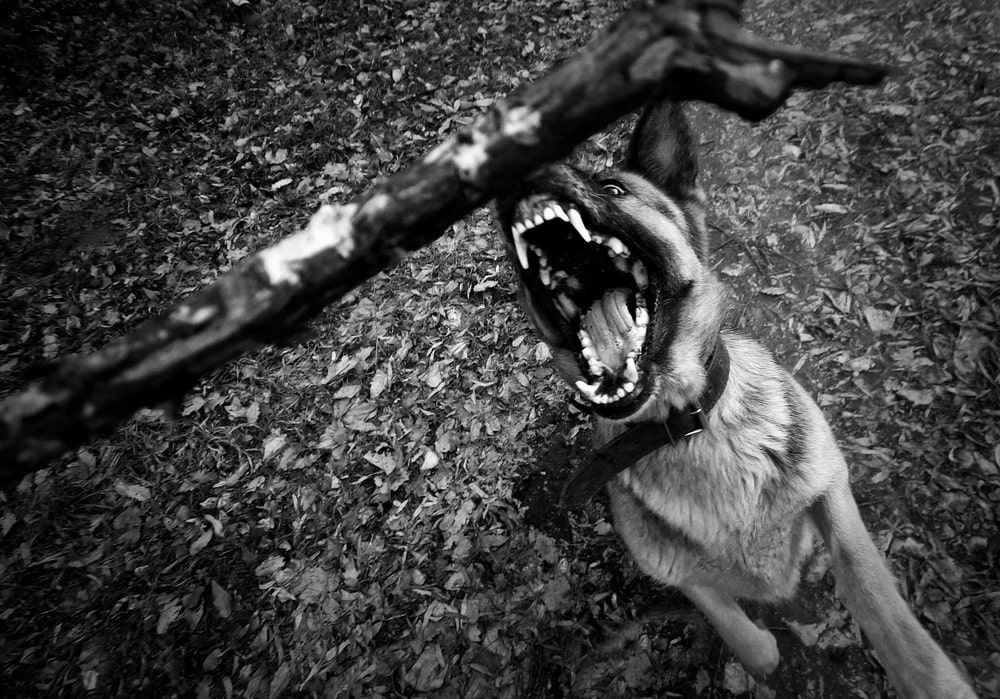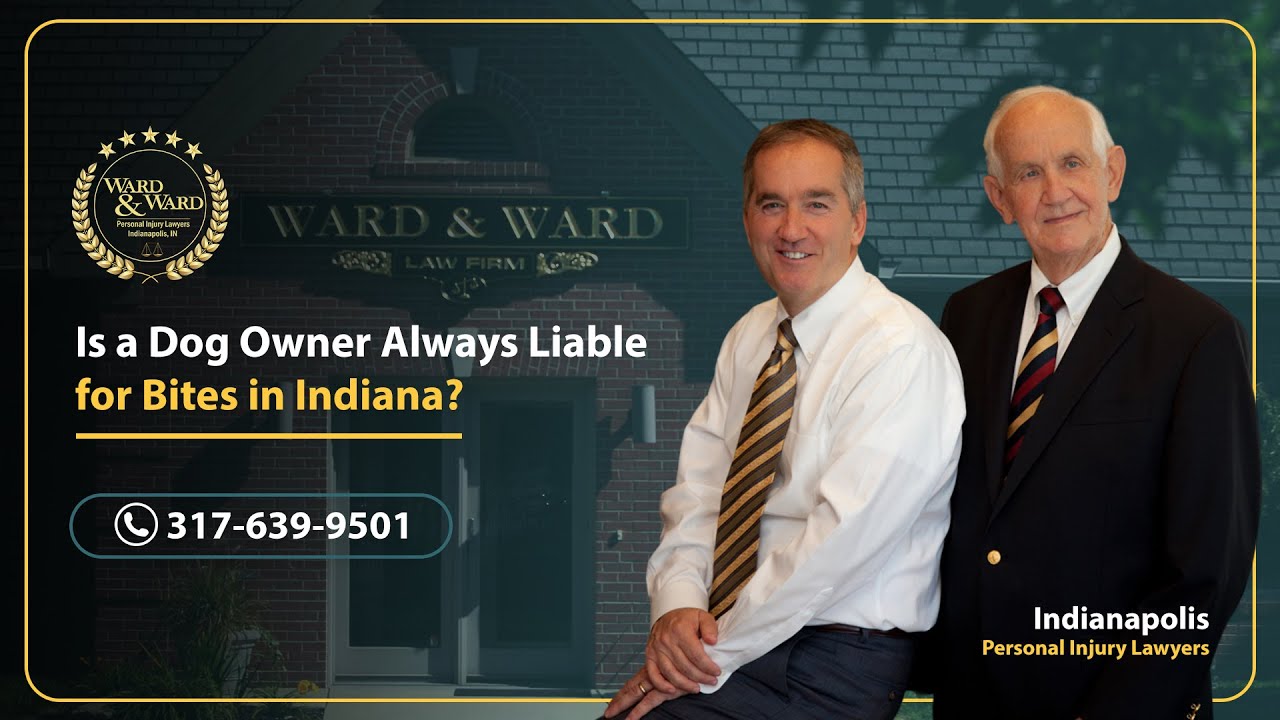
Dog bites cause serious injuries every year in Indiana. Deep puncture wounds, nerve damage, scarring, and infections are common outcomes. Children face particularly high risks of facial injuries and lasting psychological trauma from dog attacks.
When a dog bites you or someone you love, the first question is often whether the owner can be held responsible. Indiana’s approach to dog bite liability is more nuanced than many people realize. At Ward & Ward Personal Injury Lawyers, we’ve handled numerous dog bite cases and understand exactly what it takes to hold negligent owners accountable.
Indiana’s Modified One-Bite Rule
Indiana doesn’t follow the strict liability approach used in some states. We use what’s called a “modified one-bite rule” combined with negligence principles. This means dog owners aren’t automatically liable just because their dog bit someone.
Under Indiana law, you generally need to prove one of two things to hold an owner liable:
The owner knew or should have known the dog had dangerous tendencies. This is the traditional “one-bite rule” concept. If a dog has bitten before, acted aggressively toward people, or shown vicious behavior, the owner is on notice about the risk.
The owner was negligent in controlling or restraining the dog. Even if the dog has no history of aggression, owners have a duty to exercise reasonable care in managing their animals. Failing to properly restrain a dog or allowing it to run loose can constitute negligence.
The practical reality is that most dog bite cases in Indiana involve proving negligence rather than relying solely on a dog’s prior bad acts.
Proving The Owner Knew About Dangerous Tendencies
If a dog has bitten someone before, the owner has clear knowledge of dangerous propensities. But prior bites aren’t the only way to establish this knowledge. We can demonstrate an owner knew about risks through:
- Previous aggressive incidents without actual bites
- Growling, lunging, or snapping at people
- Animal control reports or complaints from neighbors
- The owner’s own statements about the dog being aggressive or protective
- Evidence the dog was trained as a guard or attack dog
Some owners claim their dog “never did anything like this before,” but when we investigate, we often find unreported incidents or warnings the owner ignored. Witness statements from neighbors, postal carriers, or delivery drivers can reveal a pattern of aggressive behavior.
Negligence In Dog Bite Cases
Negligence provides another path to holding dog owners liable. Indiana law requires dog owners to exercise reasonable care to prevent their animals from injuring others. This duty applies regardless of whether the dog has shown prior aggression.
Common examples of owner negligence include:
- Allowing a dog to roam unleashed in violation of leash laws
- Failing to properly secure a fence or gate
- Leaving a dog unsupervised with children
- Bringing an aggressive dog into public spaces without proper restraint
- Ignoring warning signs that a dog is stressed or agitated
- Failing to follow breed-specific regulations if applicable
Many Indiana municipalities have leash laws requiring dogs to be restrained in public areas. Violating these ordinances can serve as evidence of negligence. Indiana Code § 15-20-1-3 addresses various animal control issues, though specific requirements often come from local ordinances.
Defenses Dog Owners Use
Dog owners and their insurance companies raise several common defenses in bite cases. Understanding these helps you protect your claim from the start.
Trespassing: If you were unlawfully on the owner’s property when bitten, the owner may not be liable. However, this defense has limits. Children, postal workers, and others with implied permission to be on the property typically aren’t considered trespassers.
Provocation: If you provoked the dog immediately before the attack, the owner might escape liability. Provocation means intentionally antagonizing the animal, not simply petting it or walking nearby. Accidentally stepping on a dog’s tail usually doesn’t qualify as provocation.
Assumption of Risk: This defense applies when you knowingly and voluntarily accept the risk of being bitten. For example, if someone warned you about their dog bites and you chose to approach anyway, you might have assumed the risk.
Comparative Fault: Indiana follows a modified comparative fault rule. If you’re found partially at fault for the incident, your compensation is reduced by your percentage of fault. If you’re 51% or more at fault, you cannot recover anything.
Special Considerations For Dog Attacks On Property
Where the attack occurred matters significantly. Dogs attacking people on their owner’s property present different legal issues than attacks in public spaces or on someone else’s property.
Property owners generally owe different duties depending on why someone is on their land. Invited guests receive the highest level of protection. The owner must warn them about known dangerous conditions, including aggressive dogs.
Postal workers, delivery drivers, and similar individuals have a legal right to be on the property and are protected even if they’re not social guests. If a dog attacks a mail carrier, the owner faces significant liability exposure.
Landlord Liability For Tenant’s Dogs
Sometimes the property owner isn’t the dog owner. If you’re bitten by a tenant’s dog, can you sue the landlord? Indiana law allows landlord liability in limited circumstances:
The landlord knew the tenant had a dangerous dog and had authority to remove it but failed to do so. Simply knowing a tenant has a dog isn’t enough. The landlord must know about specific dangerous propensities and have the legal right to require removal of the animal.
Landlords who maintain common areas where an attack occurs might also face premises liability claims if they failed to address known dangers.
Damages Available In Dog Bite Cases
Dog bite injuries often result in substantial damages. Victims can pursue compensation for:
- Medical expenses including emergency treatment, surgery, and future care
- Lost wages if injuries prevent you from working
- Pain and suffering from the physical trauma
- Scarring and disfigurement, particularly for facial injuries
- Psychological trauma and fear of dogs
- Loss of enjoyment of life
Children who suffer facial scarring from dog bites may need multiple reconstructive surgeries as they grow. These future medical costs must be factored into any settlement or verdict.
Steps To Take After A Dog Bite
Your actions immediately after an attack affect both your health and your legal claim. First, get medical attention promptly. Dog bites carry high infection risks and need professional cleaning and treatment. Documentation from your initial medical visit becomes important evidence later.
Report the incident to local animal control. An official report creates a record of the attack and triggers an investigation. Animal control may quarantine the dog to check for rabies and document its behavior.
Gather information about the dog and owner. Get the owner’s name, contact information, and insurance details if possible. Take photos of your injuries, the location where the attack occurred, and the dog if you can do so safely. Identify any witnesses and get their contact information.
Document everything about the incident and your recovery. Keep records of all medical treatment, medications, and how injuries affect your daily activities. Save receipts for any expenses related to the bite.
Avoid giving recorded statements to the dog owner’s insurance company before speaking with an attorney. Insurance adjusters may try to get you to say things that minimize the owner’s liability or your injuries.
Why Insurance Companies Fight Dog Bite Claims
Homeowners and renters insurance policies typically cover dog bite liability. However, insurance companies often resist paying fair compensation. They might argue you provoked the dog, that you were trespassing, or that the owner had no reason to know the dog was dangerous.
Some insurers exclude certain breeds from coverage entirely or cancel policies after a first bite incident. This complicates recovery if an attack involves a breed the insurer considers high-risk.
Our Westfield personal injury lawyer team knows how to counter insurance company tactics and build strong cases demonstrating owner liability. We gather evidence about prior incidents, document lease violations or ordinance violations, and work with medical professionals to fully document your injuries.
Children And Dog Bites
Children represent a large percentage of dog bite victims. Young children can’t be held to the same standard as adults when evaluating provocation or assumption of risk. Indiana courts recognize that children may not understand the risks of approaching a dog or recognize warning signs of aggression.
Parents can also recover compensation for their child’s medical expenses and other damages. Watching a child suffer through painful treatments and develop a lasting fear of dogs causes real harm to the entire family.
Time Limits For Filing Claims
Indiana’s statute of limitations gives you two years from the date of the dog bite to file a lawsuit. Missing this deadline typically means losing your right to compensation entirely. While two years seems generous, building a strong case takes time, and you shouldn’t wait until the last minute to seek legal help.
Dog bite cases in Indiana require proving either that the owner knew about dangerous tendencies or was negligent in controlling the animal. These aren’t always straightforward claims. Insurance companies fight hard to avoid paying, and owner negligence requires gathering substantial evidence. If you or a family member has been bitten by a dog, reach out to our Westfield personal injury lawyer team to discuss your situation and learn how we can help you pursue the compensation you deserve.



